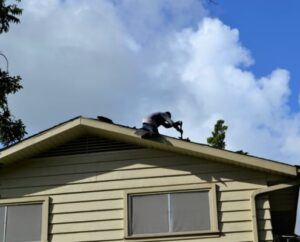TIPS FOR SELLERS BEFORE A HOME INSPECTION
Selling your beautiful home comes with a host of chores, tasks and steps that all go towards getting it ready to move. Most of the things you do are geared towards making your home appealing to a buyer, but what about after you’ve got that offer?
Once you’ve got an interested buyer, they will want to have a home inspector take a look at your property. What should you do to sure that the process goes smoothly? In this guide, we’ll discuss eight of our top tips for sellers before home inspections. A home inspection isn’t something many potential buyers skip. Here are some tips to make the process smoother.
THINK ABOUT CURB APPEAL
We’re sure your Realtor told you how important curb appeal is. Making that first impression is huge when a buyer arrives. But a different kind of curb appeal can make your home’s inspection a breeze.
Make sure there is 4-6 inches of clearance between the siding and any landscaping materials.
Cut back any vegetation to ensure about a foot of clearance between it and the house.
Visually inspect the siding and trim, if you see any damage, go ahead and have it repaired beforehand.
Repair missing caulking and trim and fix any exposed nail heads.
Check the operation of any exterior doors, locks and deadbolts. If you see a gap, have it filled properly.
Remove any stored items that are kept against the side of the house.
CHECK YOUR ROOF & GUTTERS
receives its fair share of rain and wind, so making sure that your roof and gutters are in good working order is a huge priority for buyers. Make sure to:
Clean the roof of any debris with a blower or pressure washer.
Repair any damage and replace any missing elements correctly. Temporary fixes like mastic or caulk will be noted as a defect.
Clean the gutters thoroughly
Ensure the downspouts and other drains are free of obstruction and are flowing properly. Also, make sure the run off isn’t pooling next to the house.

Home Inspection Tips for First Time House Buyers
First time buyers who put a contract on a house are doing something very exciting. It is your first home, and you are about to take part in the American dream! But as soon as you submit the contract, you should order a home inspection. A home inspection is essential to ensure that the home is in good condition, and that you are not going to have some unpleasant surprises down the road that cost you a lot of money. But not every home inspection is the same. To ensure that you get a good home inspection that tells you everything you need to know about your new home
Research the Home Inspector
Home inspections are great but they are only as good as the inspector doing the work. Too many home buyers and sellers just take whatever the name is of an inspector that they find or is recommended. If you are going to pay several hundred dollars for a home inspection, you want the inspection to be done right.
Some important questions to ask the inspector are:
How many years have you been inspecting homes?
How many home inspections have you done in the last five years?
What type of certifications and training do you have?
What did you do for a living before you were a home inspector? It is good if the inspector was involved in contracting or the building trades.
Attend the Inspection
You may not have to attend the home inspection, but you should. Just reading the inspection report is not usually enough to give you the complete picture. If you do not actually see the inspection going on, you may not have as good an understanding of potential home problems. Some home inspectors will actually turn down inspections because the potential buyer or seller is not there or does not want to be there. A good inspection can take several hours, so you should put aside plenty of time for this essential job. The results of the inspection can tell you whether you should really buy the home or should consider another, so showing up is important.
Read the Inspection Report
If you pay $400 for a home inspection, it is not going to do you much good if you do not read the report! You should spend at least 30 minutes going over the report, ideally with the inspector available for any questions or clarifications. It will help if the inspector uses very clear and concise language in the report. A good inspection report will state in simple language anything that is wrong with the home, and what is needed to fix it.

A home inspection checklist for buyers
Having an offer accepted on your dream house may seem like cause for celebration, but you’re not done just yet. You’ll need to get that home and its property inspected before you can pop the bubbly, and there are plenty of problems that could be hiding. This isn’t about peeling paint, which will be both obvious and pretty easy to fix, but about big ticket items that can affect the livability of the property.
Oil tank
If you’re buying a house that is heated using oil and intend keep it that way, this might not be a big deal. However, if the house is heated with gas, the home might once have been heated by oil and you should find out if there is an oil tank on the property.
HVAC system
“A standard home inspector will confirm that a home’s heating, ventilation, and air-conditioning system (HVAC) is functional at the time of inspection, but will make no guarantee that it will keep working once you purchase the home,”
Roof
Roof problems are responsible for 39 percent of homeowners insurance claims, according to Trulia. “Find out how old the roof is and if there are any issues,”
Structural integrity of the chimney
“Chimneys can be a very costly enterprise,” says. Your inspector should look for signs of damage to the chimney lining on the inside, faults in the masonry around the chimney, and corrosion

Home Seller’s Guide to Home Inspections
Home sales are almost always contingent upon passing a home inspection. Though inspections typically occur after a buyer’s offer is accepted, there are several advantages to having your property inspected before you even put it on the market.
Get a Pre-Listing Home Inspection
No home is without faults, even those that are freshly built, so it’s important for you as the seller to understand that your home will likely have a few problem areas.
For example most commonly, home inspectors cite issues like chipping paint, threadbare carpets and extremely hot attics, all of which often go unnoticed by the sellers who’ve lived there for some time.
With the exception (perhaps) of the overheated attic, these minor cosmetic flaws can be fixed easily and at a relatively low price. Major issues, however, arise when an inspector discovers cracks in a home’s foundation, faulty plumbing, problems with heating and ventilation and bad electrical wiring.
Prior to your pre-market inspection, check your property for any indications of damage such as staining under kitchen and bathroom sinks, buckled or sloping floors and charred or discolored wall outlets.
What You Should Expect from a Home Inspection
If you’re buying a new home, then sooner or later you’ll need to have a home inspection done. While not usually required, obtaining a home inspection is common practice in real estate and is almost entirely done for the benefit of the purchaser, even if they’re paying for it out of their own pocket.
A home inspector is a qualified person who will take a detailed look at your home and alert you to any safety hazards, hidden damage, and the expected life span of various mechanical appliances throughout the home. A house inspection may give you some negotiating power to reduce the price or request repairs of any identified issues before continuing with the sale.
What to expect during a home inspection
A house inspection is a routine process during which a home inspector takes a look at the house. Once you are under contract on a home, you’re ready to hire a home inspector. Based on what the home inspector finds, you can decide to back out of the contract without a penalty, or you can proceed with negotiations.
Meeting your home inspector at the property.
It’s always a good idea to meet your home inspector at the subject property. This way you can get to know them and ask them any questions. After the inspection, the home inspector can talk you through any issues that he/she uncovered while going through the house.
Your home inspector should inspect every nook and cranny.
A good home inspector will check out every part of your house. They’ll go in the attic. They’ll go into the basement. They’ll check every door and window, and even the roof. The home inspector will also run your water to check for potential plumbing issues. A home inspection will typically last two to three hours or more — depending on the size of the home.